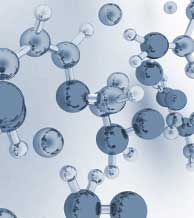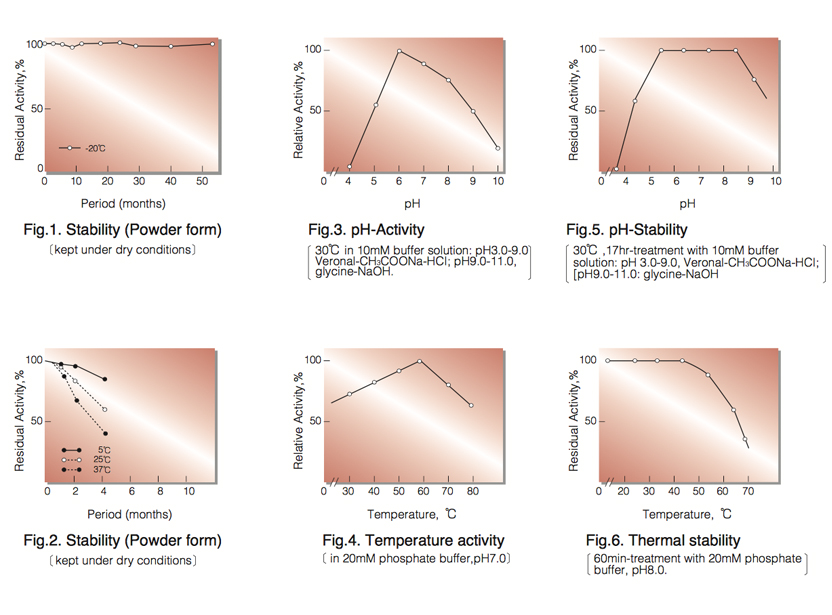UREASE from Jack bean
URH-201
Urea amidohydrolase (EC 3.5.1.5)
(NH₂)₂CO +H₂O ► 2NH₃ + CO₂
| Appearance: | White amorphous powder, lyophilized |
|---|---|
| Activity: | GradeⅡ(-201) 100U/mg-solid or more |
| Contaminants: | Asparaginase ≤2.0×10⁻²% Arginase ≤2.0×10⁻³% NH₄⁺ ≤5.0×10⁻⁴µg/U |
| Stabilizers: | EDTA, glutathione, succinate, BSA |
| Stability: | Stable at -20°C for at least One year (Fig.1) |
|---|---|
| Molecular weight : | approx. 480,000 ¹ ⁾ |
| Isoelectric point : | 5.0-5.1¹ ⁾ |
| Michaelis constant: | 1.05×10⁻²M (Urea)¹ ⁾ |
| Structure: | 8 active sites with SH-groups per the enzyme molecule ² ⁾ |
| Inhibitors: | Heavy metal ions (Ag⁺,Hg⁺⁺,etc.) |
| Optimum pH : | 6.0(Fig.3) |
| Optimum temperature : | 60°C(Fig.4) |
| pH Stability : | pH 5.5-8.5 (30°C, 17hr)(Fig.5) |
| Thermal stability : | below 50°C (pH 8.0, 60min)(Fig.6) |
| Effect of various chemicals: | (Table 1) |
APPLICATIONS ³ ⁾
This enzyme is useful for enzymatic determination of urea in clinical analysis.
ASSAY
Principle:
urease
(NH₂)₂CO+H₂O+2H⁺ ► 2NH₄⁺+CO₂
glutamate dehydrogenase
2NH₄⁺+2α-Ketoglutarate+2NADPH ► 2Glutamate+2H₂O+2NADP⁺
The disappearance of NADPH is measured at 340nm by spectrophotometry.
Unit definition:
One unit causes the formation of two micromoles of ammonia per minute under the conditions described below.
Method:
| A. Urea solution: | 6.0M (36g of Urea/100ml of H₂O)(Should be prepared fresh) |
|---|---|
| B. Tris-HCl buffer, pH 8.0: | 50mM |
| C. α-Ketoglutarate solution : | 0.25M (Dissolve 730mg of α-ketoglutarate in 15 ml of H₂O, adjust pH to 5.0±0.1 with 5N NaOH and fill up to 20ml with H₂O)(Should be prepared fresh) |
| D. NADPH solution : | 15mM[Dissolve 136mg of NADPH・Na₄・4H₂O/10ml of H₂O](Should be prepared fresh) |
| E. Working solution (Prepare: before use and store on ice) | 69ml Tris-HCl buffer (B) 0.3ml α-Ketoglutarate solution (C) 1.8ml NADPH solution (D) 0.9ml H₂O |
| F. GlDH (glutamate: dehydrogenase) solution | ca.1,000U/ml[Toyobo GradeII,GTD-209 (Tris-HCl buffer solution, free from ammonia)] |
| G. Enzyme diluent : | 10mM K-phosphate buffer containing 20mM EDTA and 0.2% BSA, pH 7.0 |
Procedure
| Concentration in assay mixture | |
|---|---|
| Tris-HCl buffer | 38 mM |
| Urea | 200 mM |
| α-Ketoglutarate | 0.83mM |
| NADPH |
0.30mM |
| EDTA | 0.67mM |
| GlDH | ca.17 U/ml |
1. Prepare the following reaction mixture in a cuvette (d=1.0cm) and equilibrate at 37°C for about 5 minutes.
2.40ml Working solution (E)
0.05ml GlDH solution (F)
0.35ml H₂O
0.10ml Enzyme solution*
2. Add 0.10ml of urea solution (A) and mix by gentle inversion.
3. Record the decrease in optical density at 340nm against water for 3 to 4 minutes in a spectrophotometer
thermostated at 37°C, and calculate the ΔOD per minute from the initial linear portion of the curve (ΔOD test).
At the same time, measure the blank rate (ΔOD blank) by using the same method as the test except that the enzyme diluent is added instead of the enzyme solution.
* Dissolve the enzyme preparation in ice-cold enzyme diluent (G) and dilute to 0.07−0.25U/ml with the same buffer and store on ice.
Calculation
Activity can be calculated by using the following formula :

ΔOD/min (ΔOD test-ΔOD blank)×Vt×df
Volume activity (U/ml) = = ΔOD/min×2.41×df
6.22×2×1.0×Vs
Weight activity (U/mg)=(U/ml)×1/C
- Vt
- : Total volume (3.0ml)
- Vs
- : Sample volume (0.10ml)
- 6.22
- : Millimolar extinction coefficient of NADPH at 340nm (㎠/micromole)
- 2
- : Factor based on the fact that hydrolysis of one mole of urea is equivalent to oxidation of two moles of NADPH
- 1.0
- : Light path length (cm)
- df
- : Dilution factor
- C
- : Enzyme concentration in dissolution (c mg/ml)
REFERENCES
- J.B.Sumner and D.B.Hand; J.Am.Chem.Soc., 31, 1255 (1929)
- G.Gorin and C.C.Chin; Biochim.Biophys.Acta., 99, 418 (1965)
- Rinsho Kagaku Bunseki(Japanese), Ⅱ, p18(M.Kitamura,M.Saito and M.Niwa,ed.)Tokyo Kagaku Dojin,Tokyo
(1969) - H.G.Schlegel and H.Kaltwasser; Methods of Enzymatic Analysis, Vol.2,p1081 (H.U.Bergmeyer,ed.), Verlag Chemie Weiheim, Acdemic Press, New York-London (1974)
| Chemical | Concn.(mM) | Residual activity(%) |
Chemical | Concn.(mM) | Residual activity(%) |
|---|---|---|---|---|---|
| None | − | 100% | MnCl₂ | 1.0 | 66 |
| NaCl |
10 | 96 | MgCl₂ | 1.0 | 97 |
| Na₂SO₄ | 10 | 104 | CaCl₂ | 1.0 | 105 |
| CH₃COONa | 10 | 108 |
ZnCl₂ | 1.0 | 104 |
| Na₂ HPO₄ | 10 | 100 | FeSO₄ | 1.0 | 94 |
| Citrate-Na₂ | 10 | 100 | CuSO₄ | 1.0 | 99 |
| Na₂CO₃ | 10 | 100 | Ag₂SO₄ | 0.1 | 9 |
| Na₃BO₄ | 10 | 104 |
HgCl₂ | 0.1 | 8 |
| Na₃S₂O₄ | 10 | 108 |

To get a quote, contact us at info@toyobousa.com, or INQUIRY.